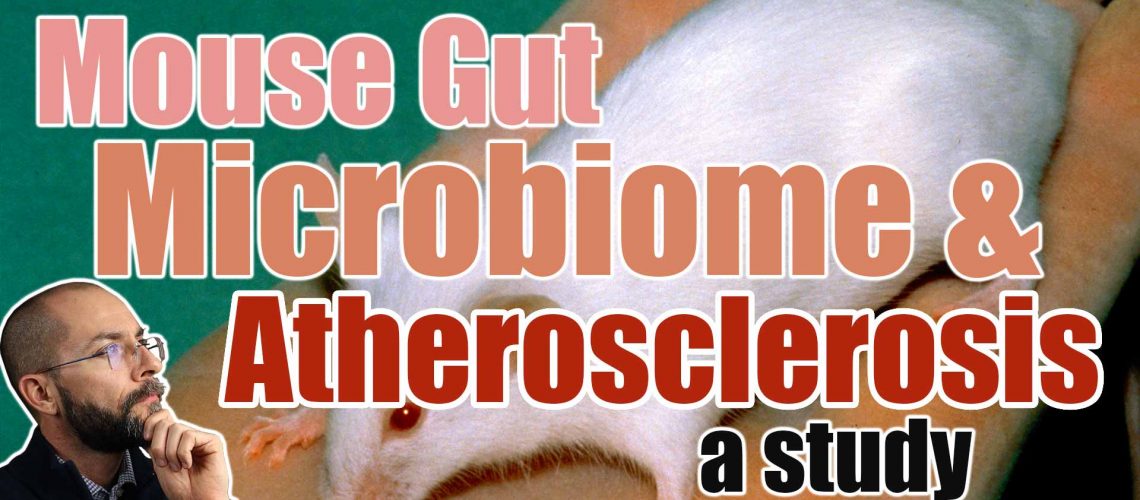In this article I talk about an amazing new study published on June 15, 2020 in Nature Biotechnology by scientists at Scripps Research in La Jolla, CA.
They showed that altering the gut microbiome of mice resulted in lower cholesterol and less arterial plaque formation. The study gets us closer to unraveling the mysteries of the microbiome.
The Study
Your gut microbiome has a profound impact on your overall health. Unfavorable microorganisms in the gut can contribute to a bunch of different chronic diseases including cardiovascular disease, obesity, diabetes, and central nervous system disorders.
You have a certain level of control over what species of microbes occupy your gut based on your dietary decisions. People who eat a standard western diet are at a higher risk of developing atherosclerosis.
The researchers in the study wanted to see if changing the microbiome would influence cholesterol production and the subsequent development of atherosclerosis in mice. In the study, they used mice that genetically have a similar cholesterol profile to humans. One group of mice were fed a western diet which is basically what most Americans eat daily. Due to genetics this group of mice develop high cholesterol and arterial plaques after a few weeks of eating this way. Another group of mice with the same genes were fed a healthier diet which does not result in elevated cholesterol or accelerated arterial plaque formation.
After two weeks, the gut microbiomes of both groups of mice were found to be significantly different from each other. This showed that diet had an impact on the composition of the gut microbiomes in both groups.
But this phenomenon is already known in other research. What the researchers wanted to show was that gut bacteria were involved in the development of high cholesterol and atherosclerosis. In other words, they wanted to show that the development of high cholesterol and atherosclerosis was a multi-step process that depends on the composition of the gut microbiome. With that information, therapies that target the composition of the gut microbiome may be useful in the reduction of high cholesterol and arterial plaque formation in humans despite what the humans eat.
That was their hypothesis and they did a good job of demonstrating it in the study.
Here’s What They Did
They developed specific peptides that alter the composition of species of bacteria in the guts of the mice by inhibiting growth of some species and promoting growth of others. Kind of like an antibiotic but not as destructive.
The peptides were put in the drinking water of one group of mice eating the western diet and in one group of mice eating a healthy diet. (They also had other test groups with different peptides but I’m keeping it simple for you.) Another group of mice eating the western diet were not given the peptides.
After just 2 weeks, the mice eating a western diet with the peptides had a 36% reduction on total cholesterol and a 56% decrease in triglycerides compared to the mice eating a western diet without the peptides. It was mainly VLDL and LDL, the bad cholesterol, that lowered.
They also showed that the gut microbiomes of the mice fed the western diet with the peptides changed.
Some species known to cause increased cholesterol lowered in numbers while other species known to reduce cholesterol increased in numbers. This links the development of high cholesterol with diet and the gut microbiome composition.
Furthermore, at the conclusion of the 10-week study they found that the mice on a western diet treated with the peptides had less plaque formation in the aorta compared to the mice on a western diet not treated with peptides.
This is pretty cool stuff. They demonstrated that the composition of the microbiome does play a part in the development of high cholesterol and atherosclerosis and the peptides that they produced could help mitigate cardiovascular disease (atherosclerosis) despite eating a western diet.
In addition to all of that, the researchers also began to unravel the mechanisms involved in lowering the cholesterol and atherosclerosis in the peptide treated mice.
They found changes in gene expression in the mice that affected things like inflammation, immune function, gut integrity, and liver detoxification.
In the end, they question whether their results were caused by changes in abundance of bacteria species or changes in gene expression. I’m curious to see what further research will show.
Chen, P.B., Black, A.S., Sobel, A.L. et al. Directed remodeling of the mouse gut microbiome inhibits the development of atherosclerosis. Nat Biotechnol (2020). https://doi.org/10.1038/s41587-020-0549-5
